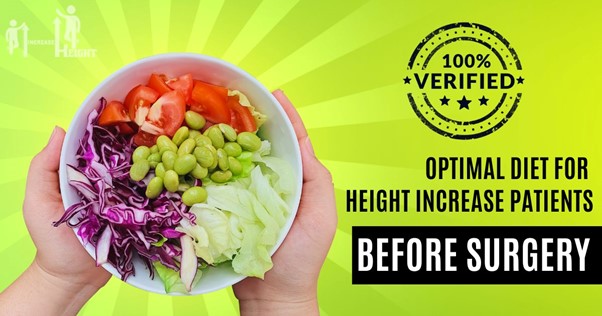- Address: D-30, Sushant Lok III, Sector 57, Gurugram
- [email protected]
- Phone: +91 9971119604

Height increase surgeries are becoming increasingly popular among individuals looking to boost their height for both personal and professional reasons. However, successful surgery isn’t just about the procedure itself—it’s also about how well-prepared your body is beforehand. A balanced diet plays a critical role in preparing your body for the demands of surgery, ensuring better outcomes, and faster recovery. In this blog, we’ll discuss the best diet plan for height increase patients before undergoing surgery, breaking down key nutritional components that are essential for optimal results.
Protein: The Building Block of Growth
Importance: Proteins are vital for tissue repair, muscle growth, and overall cell function. Given that height increase surgery involves bone elongation and soft tissue manipulation, adequate protein intake is essential for facilitating these processes.
Sources: Incorporate lean meats like chicken, turkey, and fish into your diet. For vegetarians, options like tofu, legumes, and dairy products are excellent. Protein shakes and supplements can also be used if your regular diet falls short.
Daily Requirement: Aim for about 1.2 to 2.0 grams of protein per kilogram of body weight, depending on your activity level and overall health.
Calcium: Strengthening Your Bones
Importance: Calcium is crucial for bone health. As the surgery involves bones, ensuring that they are strong enough to handle the stress of elongation is critical.
Sources: Dairy products like milk, cheese, and yogurt are rich in calcium. For those who are lactose intolerant or vegan, fortified plant-based milk, almonds, and leafy greens like spinach and kale are good alternatives.
Daily Requirement: A daily intake of 1000-1200 mg of calcium is recommended for adults preparing for height increase surgery.
Vitamin D: Enhancing Calcium Absorption
Importance: Vitamin D plays a key role in calcium absorption and bone mineralization. Without adequate Vitamin D, your body won’t be able to efficiently utilize the calcium from your diet.
Sources: Sunlight is a natural source of Vitamin D, but dietary sources include fatty fish like salmon and mackerel, fortified foods, and supplements.